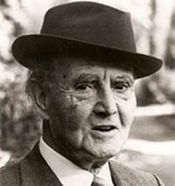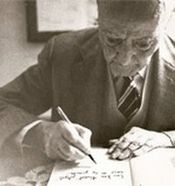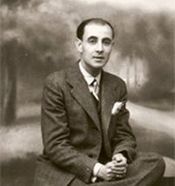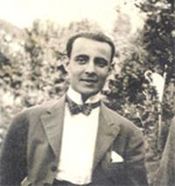A name for the public library of Sarrià
27/05/202127/05/2021
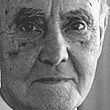 Antoni Martí Monterde, foix’s studious Antoni Martí Monterde, professor of Comparative Literature at the UB, has published an article in the Núvol in which he argues why the public library of Sarrià should be named after the poet J. V. Foix. The story begins as a dream, in fact, it is a dialogue between two of the most important writings of J. V. Foix: «Plaça Catalunya- Pedralbes» and «L’Estació» with a place, Plaça de Sarrià.
Antoni Martí Monterde, foix’s studious Antoni Martí Monterde, professor of Comparative Literature at the UB, has published an article in the Núvol in which he argues why the public library of Sarrià should be named after the poet J. V. Foix. The story begins as a dream, in fact, it is a dialogue between two of the most important writings of J. V. Foix: «Plaça Catalunya- Pedralbes» and «L’Estació» with a place, Plaça de Sarrià.
Here you can read it.
«M’exalta el nou i m’enamora el vell»
15/05/202127/05/2021
 «M’exalta el nou i m’enamora el vell» is the J. V. Foix‘s verse Insensats have recently chosen to add to their t-shirts collection, along with those of five other authors. This collection also includes handbags.
«M’exalta el nou i m’enamora el vell» is the J. V. Foix‘s verse Insensats have recently chosen to add to their t-shirts collection, along with those of five other authors. This collection also includes handbags.
Insensats aims to give more visibility to Catalan literature through t-shirts, each of which has an original design that illustrates the author’s text.
FNEC: 89 years in the service of the country
27/04/202127/05/2021
 In 1932 a group of Catalan nationalist students founded the FNEC (Federació Nacional d’Estudiants de Catalunya) and in a short time it became the most representative student union in the country.
In 1932 a group of Catalan nationalist students founded the FNEC (Federació Nacional d’Estudiants de Catalunya) and in a short time it became the most representative student union in the country.
J. V. Foix was one of its first partners and already then he pointed out: «The students, in addition to studying, must be activists of what the revitalization of our culture and the social and political elevation of the country entail.»
Some «notes» on Ramon Llull and Foix (1933-1938)
14/04/202114/04/2021
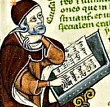 Last year, Professor Lluís Cabré published in Studia Lulliana some «notes» based on J. V. Foix‘articles on Llull that appeared in La Publicitat between 1933 and 1936, and in other data from those years. These notes aim at portraying Foix’s unique identification with Llull’s oeuvre.
Last year, Professor Lluís Cabré published in Studia Lulliana some «notes» based on J. V. Foix‘articles on Llull that appeared in La Publicitat between 1933 and 1936, and in other data from those years. These notes aim at portraying Foix’s unique identification with Llull’s oeuvre.
In addition, it is suggested that Llull’s Desconhort may be the source for the metaphysical pain conveyed at the beginning of Sol, i de dol.
Here you can read the article.
Miró-ADLAN: An Archive of Modernity (1932-1936)
31/03/202107/04/2021
 The exhibition presents documents and materials from the ADLAN archive, kept in various public and private centers and allows us to re-examine the key word that the group had in the construction of modernity in Catalonia. Among the characters that made this regeneration of the concept of modern culture possible are Joan Prats, Josep Lluís Sert, Adelita Lobo, J. V. Foix, and Sebastià Gasch.
The exhibition presents documents and materials from the ADLAN archive, kept in various public and private centers and allows us to re-examine the key word that the group had in the construction of modernity in Catalonia. Among the characters that made this regeneration of the concept of modern culture possible are Joan Prats, Josep Lluís Sert, Adelita Lobo, J. V. Foix, and Sebastià Gasch.
Place and dates: Fundació Miró. Parc de Montjuïc Barcelona. Dates: from March 12 to July 4
See photographs here.
International poetry day
19/03/202121/03/2021
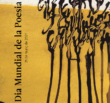 Unesco declared March 21 World Poetry Day. This year the Institució de les Lletres Catalanes has chosen the writer, painter and translator Felícia Fuster (Barcelona, 1921 – Paris, 2012) whose poem han been translated to 21 languages.
Unesco declared March 21 World Poetry Day. This year the Institució de les Lletres Catalanes has chosen the writer, painter and translator Felícia Fuster (Barcelona, 1921 – Paris, 2012) whose poem han been translated to 21 languages.
This year we participate in the celebration with the poem by J. V. Foix, Tota amor és latent en l’altra amor.
Presentation of És quan plou que ballo sol
15/03/202115/03/2021
 The presentation of the Aleix Cort’s És quan plou que ballo sol. Una aproximació a lobra de Foix a través del ball book by the filologist specializing in Noucentisme Josep Murgades will take place on Thursday 18 March.
The presentation of the Aleix Cort’s És quan plou que ballo sol. Una aproximació a lobra de Foix a través del ball book by the filologist specializing in Noucentisme Josep Murgades will take place on Thursday 18 March.
Day: Thursday 18 March at 19 p.m.
Place: Sala Emili Argilaga. Centre de lectura de Reus.
It can also be seen live on Youtube.
«M’exalta el nou i m’enamora el vell», a l’escola Poeta Foix
05/03/202116/05/2021
 At the escola Poeta Foix they have not stopped working despite the pandemic. In the video they have recorded how different class groups work. The motto of this 2020-2021 academic year is the verse by J.V. Foix: «M’exalta el nou, m’enamora el vell».
At the escola Poeta Foix they have not stopped working despite the pandemic. In the video they have recorded how different class groups work. The motto of this 2020-2021 academic year is the verse by J.V. Foix: «M’exalta el nou, m’enamora el vell».
Here you can see the video.
J. V. Foix in lyrik-line
16/02/202104/03/2021
 Lyrikline is created by Literaturwerkstatt Berlin in cooperation with its international network of Lyrikline partners.
Lyrikline is created by Literaturwerkstatt Berlin in cooperation with its international network of Lyrikline partners.
It includes 11 Foix’s poems translated into 10 different languages.
They can be heard recited by the poet himself.
Here there is the link to J. V. Foix in Lyrik-line.
Anniversary of the death of J. V. Foix
29/01/202116/02/2021
e1612265055877-103×110.jpg” alt=”” width=”103″ height=”110″>This January 29 marks thirty-four years since the death of J. V. Foix. It was the year 1987.
«Ésser i traspàs fan un: tot muda i tot roman;
tots hi serem al Port amb la desconeguda.»
gener 1973
